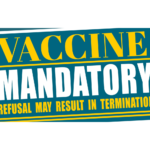NSW Supreme Court Rejects Challenges to Public Health Orders

More than a million people tuned in to the live stream of Kassam v Hazzard; Henry v Hazzard via the New South Wales Supreme Court’s YouTube channel over the past couple of weeks, many hoping for a judgement which invalidates public health orders which mandate vaccines for certain industries, such as healthcare, aged care and construction.
But these hopes were dashed on Friday, 15 October 2021, when the court delivered its judgement dismissing the cases.
Challenging requirement to vaccinate
The proceedings were brought by plaintiffs who sought to remain in their industries despite not being vaccinated.
One of the proceedings was brought by Mr Al-Munir Kassam and three other people, whose legal team argued that they had made an informed choice not to be vaccinated, that the choice should be respected on grounds of – among other things – protecting bodily integrity, and that the state has exceeded its power by making order which, in practical terms, amount to a vaccine mandate.
The proceedings were brought against Health Minister Brad Hazzard, Chief Medical Officer Dr Kerry Chant, the State of New South Wales and the Commonwealth of Australia.
Separate proceedings were brought by Natasha Henry and five other people, and like the plaintiffs in the Kassam proceedings, they also chose not to be vaccinated. These proceedings were brought against the Health Minister only.
Intense public interest
For many Australians it was an important test case, given concerns raised over mandated vaccination policies being implemented by both the NSW Government and, in some cases, by private businesses.
The intense public interest led Supreme Court Justice Robert Beech-Jones to take the extraordinary step of warning the public not to contact him – with the court reporting that over 1800 emails had been received from concerned members of the public.
In the simplest of terms, the “no jab, no job” policies left thousands of workers with no option other that to receive approved COVID-19 vaccinations or be unable to attend their workplaces.
While the plaintiffs made clear that their employment had been impacted by orders requiring vaccination, additional challenges were made against what effectively amounted to travel restrictions imposed on their LGAs.
To support the challenges, evidence was presented about concerns regarding the efficacy of COVID-19 vaccinations – including that they are ineffective against the contracting or spread of the disease, and the insufficiency of data regarding both short and long term potential side effects.
Arguments were presented regarding the infringement of public health orders on the rights to bodily integrity and privacy, asserting that they amounted to civil conscription, represented a breach of natural justice and were made by Health Minister Brad Hazzard without clear legislative authority.
The court disagreed with every argument presented by the plaintiffs, rejecting all challenges on all grounds.
No legal basis for challenging orders
In the judgement published on the NSW Supreme Court website, Justice Robert Beech-Jones remarked that “the legislation underpinning the public health orders set out to achieve an abrogation of normal rights in a pandemic”, finding that the defendants were doing exactly that with a view to achieving public health outcomes.
The Judge rejected the constitutional argument regarding civil conscription and an asserted inconsistency with the immunisation register act, finding no constitutional basis for these submissions.
Right to bodily integrity
One of the key arguments of the plaintiffs was their “freedom” or “right” to their own bodily integrity.
In his judgement, Justice Beech remarked that while the plaintiffs sought to deploy the “principle of legality” which is a rule of statutory construction to the effect that, in the absence of a clear indication to the contrary, it is presumed that statutes are not intended to modify or abrogate fundamental rights.
However, this country does not have a bill of rights, and thus, important as the principle of legality is, it is only a rule of construction.
He ruled that the right to bodily integrity was not violated as the orders did not authorise the involuntary vaccination of anyone, while the degree to which the freedom of movement was impaired differed depending on whether a person is vaccinated or unvaccinated.
“Curtailing the free movement of persons including their movement to and at work are the very type of restrictions that the Public Health Act clearly authorises,” Justice Beech-Jones found.
He also dismissed claims that Health Minister Brad Hazzard acted outside his powers, by not asking the right questions or failing to take into account relevant considerations.
Public backlash over vaccination mandates
The case was the first in Australia challenging various limitations on unvaccinated people, although there are several other similar challenges, such as the one by NSW paramedic John Larter, which is yet to be heard by the courts.
While many see this test case as a significant defeat over the policy of mandatory vaccinations, there are some important takeaways which shouldn’t be dismissed.
Firstly, the backlash from the public over these mandates, along with the coercive tactics of the government, is becoming stronger, businesses too, are pushing back against rules that decree they must only serve vaccinated customers.
Secondly, the legal challenge sends a salient message to those in positions of power that Australians will challenge rules they believe are unfair.
Thirdly, and perhaps most importantly, Australia urgently needs a Bill of Rights to protect the fundamental democratic freedoms of us all..







